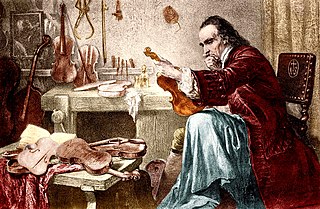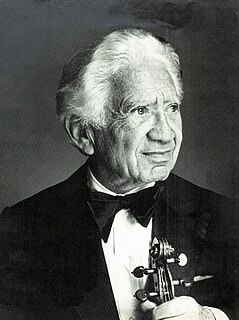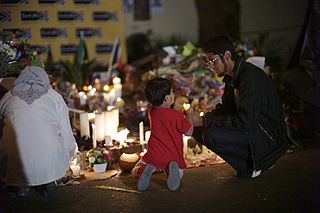
In music, an arrangement is a musical reconceptualization of a previously composed work. It may differ from the original work by means of reharmonization, melodic paraphrasing, orchestration, or development of the formal structure. Arranging differs from orchestration in that the latter process is limited to the assignment of notes to instruments for performance by an orchestra, concert band, or other musical ensemble. Arranging "involves adding compositional techniques, such as new thematic material for introductions, transitions, or modulations, and endings... Arranging is the art of giving an existing melody musical variety".

Antonio Stradivari was an Italian luthier and a crafter of string instruments such as violins, cellos, guitars, violas, and harps. The Latinized form of his surname, Stradivarius, as well as the colloquial Strad are terms often used to refer to his instruments. It is estimated that Stradivari produced 1,116 instruments, 960 of which were violins. Around 650 instruments survived, including 450 to 512 violins.
Giovanni Battista Guadagnini was an Italian luthier, regarded as one of the finest craftsmen of string instruments in history. He is widely considered the third greatest maker after Antonio Stradivari and Giuseppe Guarneri "del Gesù". The Guadagnini family was known for their violins, guitars and mandolins.

Hans Abrahamsen is a Danish composer born in Copenhagen.
The violin octet is a family of stringed instruments developed in the 20th century primarily under the direction of the American luthier Carleen Hutchins. Each instrument is based directly on the traditional violin and shares its acoustical properties, with the goal of a richer and more homogeneous sound. Unlike the standard modern stringed instruments, the main resonance of the body of the violin octet instrument is at a pitch near the two middle open strings, giving the instruments a more balanced, clearer sound.

Eugene Skeef FRSA is a South African percussionist, composer, poet, educationalist and animator living in London since 1980. He also works in conflict resolution, acts as a consultant on cultural development, teaches creative leadership and is a broadcaster. In 2003 he founded Umoya Creations, a charity set up to facilitate this international work.
Samuel Zygmuntowicz is an award-winning contemporary luthier. He began his instrument making training at age 13, and studied making and restoration under Peter Prier, Carl Becker and René Morel. Since 1985 he has been based in Brooklyn, New York. His early work demonstrates expert skill as a copyist of classic instruments. Later work includes personal models informed by intensive advanced research. Findings from this research have been published in numerous print and digital media. Zygmuntowicz is an active fiddler, playing with several folk music groups. His playing can be heard on the recordings Grand Picnic, and Jump When the Trumpets Blow.
Stefan-Peter Greiner is a German luthier.

Henri Temianka was a virtuoso violinist, conductor, author and music educator.

The presidency of Nelson Mandela began on 10 May 1994, when Nelson Mandela, an anti-apartheid activist, lawyer, and former political prisoner, was inaugurated as President of South Africa, and ended on 14 June 1999. He was the first non-white head of state in South African history, as well as the first to take office following the dismantling of the apartheid system and the introduction of multiracial democracy. Mandela was also the oldest head of state in South Africa's history, taking office at the age of seventy-five.

Hugo Walter Voigtlander was a German-American musician who played violin, viola, and viola d'amore. He was also an instrument maker, and a collector and arranger of viola d'amore music. As a youth he studied at the Royal Conservatory of Music in Leipzig and played violin and viola in several professional orchestras in Germany. He emigrated to the United States in 1885 where he spent ten years playing viola and viola d'amore with various professional chamber groups in and around Detroit, Michigan. He then spent two years in Pittsburgh, Pennsylvania playing in the Pittsburgh Symphony Orchestra, and in 1897 moved to New York City, where he played in a number of professional orchestras. In addition to playing viola d'amore, Walter Voigtlander taught viola d'amore, and made and collected numerous arrangements for the instrument.

On 5 December 2013, Nelson Mandela, the first President of South Africa to be elected in a fully representative democratic election, as well as the country's first black head of state, died at the age of 95 after suffering from a prolonged respiratory infection. He died at around 20:50 local time (UTC+2) at his home in Houghton, Johannesburg, South Africa, surrounded by his family. His death was announced by then President Jacob Zuma. Reactions from governments, international organizations, and notable individuals, gained worldwide media coverage.
"Bring Him Back Home ", also known as "Bring Him Back Home", is an anthemic anti-apartheid protest song written by South African musician Hugh Masekela. It was released as the first track of his 1987 album Tomorrow. It was recorded in 1986 when Masekela was in exile from the apartheid regime of South Africa. The melody of the song is buoyant, containing a number of powerful chords and trumpet riffs. The lyrics of the song demand the release of Black South African leader Nelson Mandela, who had been imprisoned by the white South African government on Robben Island since 1962. The song became enormously popular, and turned into an unofficial anthem of the anti-apartheid movement. It became one of Masekela's most performed live songs. It was later used as a part of the official soundtrack to the documentary film Amandla!: A Revolution in Four-Part Harmony. The song was included in the 1994 live album Hope and in the 2001 collection Grazing in the Grass: The Best of Hugh Masekela, released by Columbia Records.
Peter Paul Prier was a German-born American violinmaker, music teacher and businessman. He founded Peter Prier and Sons Violins. In 1972 he expanded his violin-fabricating business as a teaching school, in which several present-day craftsmen learned their art. He also founded the Bow Making School of America (1998).

Robert Brewer Young is a contemporary cello, viola and violin maker. He received traditional French training in the violinmaking studios above Carnegie Hall, closely studying and listening to the instruments of Stradivari, Guarneri, Amati, Gofriller, Guadagnini and other classical Italian luthiers. Young is now devoted to creating signature instruments in the spirit of these visionaries. As a part of a select group of makers, museum specialists and acousticians he is at the forefront of using 21st-century science to practice and advance 17th-century methods of violinmaking. He uses traditional techniques and Renaissance geometrical methods to recreate the elemental harmonic properties of classical Italian instruments.

"Asimbonanga", also known as "Asimbonanga (Mandela)", is an anti-apartheid song by the South African racially integrated band Savuka, from their 1987 album Third World Child. It alluded to Nelson Mandela, imprisoned on Robben Island at the time of song's release, and other anti-apartheid activists. It was well received, becoming popular within the movement against apartheid, and was covered by several artists including Joan Baez and the Soweto Gospel Choir.

Vincenzo Rugeri, was an Italian luthier of string instruments such as violins, cellos, and, violas in Cremona, Italy. His instruments are noted for their craftsmanship and tone quality. Vincenzo came from a distinguished family of luthiers, the first of whom was his father, Francesco Rugeri. Despite the local tradition of artisan families laboring together through generations, Vincenzo left the family shop and set up a successful shop of his own in the center of Cremona. Vincenzo was the third son of luthier Francesco Rugeri. Vincenzo's work, like Francesco's, is influenced by Nicolò Amati's Grand Pattern model, however Vincenzo's work was distinguished from his father's by utilizing a lower arch inspired by Antonio Stradivari. An analysis of the body of his work reveals that the quality of Vincenzo's instruments is remarkable, perhaps even more so than his father's. Vincenzo's instruments, though less numerous, are valued at least equal to those of his father. A violin by Vincenzo Rugeri realized $502,320 on October 3, 2011 at Brompton's Auctions in London. Carlo Bergonzi was a distinguished apprentice of Vincenzo Rugeri.














